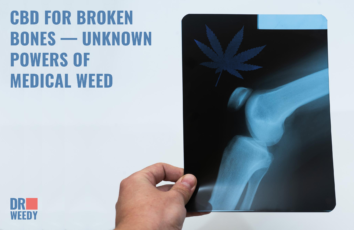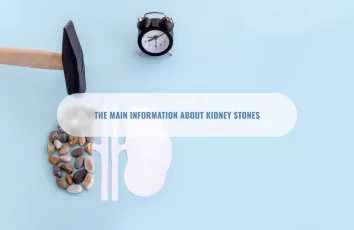CBD and Endometriosis

Endometriosis is a gynecological pathology that causes significant issues for many women. Symptoms can be very different for each individual, but the main one is pain, usually in the lower abdomen. This pain can be debilitating and omnipresent;, it can be made worse by positional changes, during sexual intercourse, during urination, etc. Modern medicine offers a wide range of options for controlling this pathological condition, including medical cannabis.
Cannabis and its constituents of tetrahydrocannabinol and cannabidiol have proven to be effective anti-inflammatory and analgesic substances. Being an absolutely natural drug, medical marijuana has minimal side effects with high effectiveness of treatment. Importantly, the number of studies on the use of CBD for endometriosis is growing every year.
What is endometriosis: causes of its occurrence
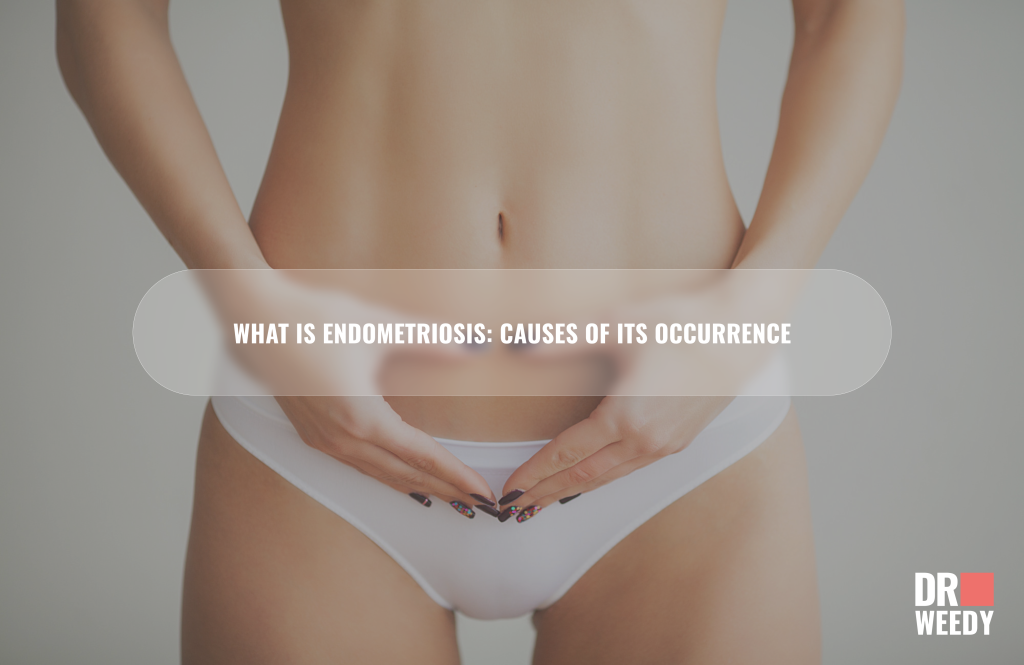
To date, there is no consensus on the cause of endometriosis. There are several theories that describe the possible causes of this disease, including:
- Genetics. The genetic nature of the disease suggests that the tendency to develop endometriosis can be transmitted genetically in a particular family or ethnic group.
- Retrograde menstruation. Proponents of this theory claim that the disease is provoked by a disturbance in menstrual drainage out of the vagina, causing backflow through the fallopian tubes, followed by embedding of endometrial tissue in the pelvis.
- Immune disorders. Immune system diseases, according to doctors, can provoke the disease. The spread of endometrial cells throughout the body outside of the uterus, combined with an inappropriate immune response, can lead to the disease.
At the same time, none of the theories is exhaustive in answering the question, “What is the cause of endometriosis?” However, modern medicine has tools available to help women deal with this common ailment.
The main symptoms of endometriosis
There is a whole range of possible symptoms of endometriosis. They can manifest themselves in various combinations and differ in intensity in each individual case. Some patients do not even feel any discomfort, while others cannot simply get out of bed because of systemic pain. The most common symptoms of endometriosis are:
- Pain in the lower abdomen and back (with intensification during menstruation);
- Intense menstrual pain that significantly reduces mobility and quality of life;
- Pain during or after sexual intercourse;
- Pain when urinating (including during menstruation);
- Inability to get pregnant for a long time.
The symptoms of endometriosis, no matter how they manifest themselves, significantly complicate the lives of patients; which, in turn, can provoke chronic depression and other psychological disorders. Therefore, modern medicine approaches the treatment of this disease in a comprehensive manner, using both traditional pharmacological agents and alternative means, including CBD and THC.
Difficulties in the treatment of endometriosis
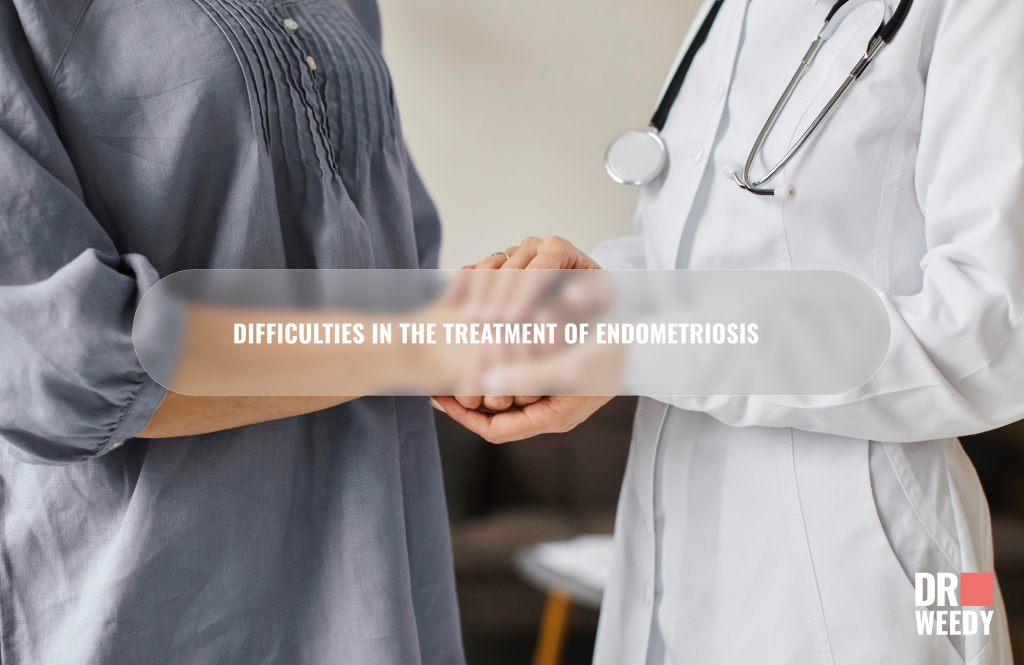
Endometriosis is a painful pathological condition that affects up to 10% of women worldwide and is one of the most common causes of infertility. This disease is characterized by an overgrowth of endometrial tissue outside the female uterus: in the pelvis, ovaries, abdominal cavity, uterine muscles, and intestines. Endometriosis often provokes cyclical pain, which occurs during menstruation, but can also cause discomfort during sexual intercourse. All these symptoms negatively affect the quality of life of a woman.
Endometriosis can be incredibly difficult to cure. Even surgical intervention may have only a temporary effect. In addition, the disease is also difficult to detect, because the pain of endometriosis often is confused with menstrual pain. Therefore, the treatment of endometriosis should be approached comprehensively and carefully.
Modern medicine offers a wide range of treatment options for this pathology. The most common are:
- The use of analgesics and anti-inflammatory drugs;
- Local application of heat compressors;
- Use of hormone regulators containing progestogens;
- Use of drugs to block the production of estrogen.
- Surgery to remove the aberrant tissue.
At the same time, medical specialists note an increased number of side effects provoked by the above-mentioned means. As for surgical intervention, it, despite its potential effectiveness, has a number of obvious risks. In addition, the operation does not guarantee that the disease will not return again.
Can cannabis help?

Among Western scientists, there is a growing interest in the medical use of cannabis for the control of chronic conditions. Currently, cannabis is used in the complex therapy of refractory chronic pain, which is a common symptom of endometriosis.
At this stage, there is a well-established opinion among medical professionals that cannabis can be beneficial for endometriosis. In particular, a study conducted by the University of Western Sydney, together with the University of New South Wales, suggests that women diagnosed with endometriosis who take marijuana report an improvement in the quality of life, which is associated with such effects as:
- reduction of pain and associated symptoms;
- mental health monitoring (depression, anxiety);
- improvement of sleep;
- control of gastrointestinal disorders;
- reduction of nausea, vomiting.
At the same time, similar surveys among New Zealand residents confirm the results of these studies. In addition, a number of medical studies confirm the ability of cannabinoid compounds to relieve endometriosis pain and relieve inflammation in endometriosis. In particular, studies in mice conducted by Spanish researchers have confirmed that THC actually reduces the growth of the endometrium. The author of the study, PhD student Alejandra Escudero-Lara, claims that THC limits the development and symptoms of endometriosis in mice as part of the experiment. Undoubtedly, such studies spur the interest of the scientific community to further study cannabis in the treatment of endometriosis.
CBD as a treatment for endometriosis
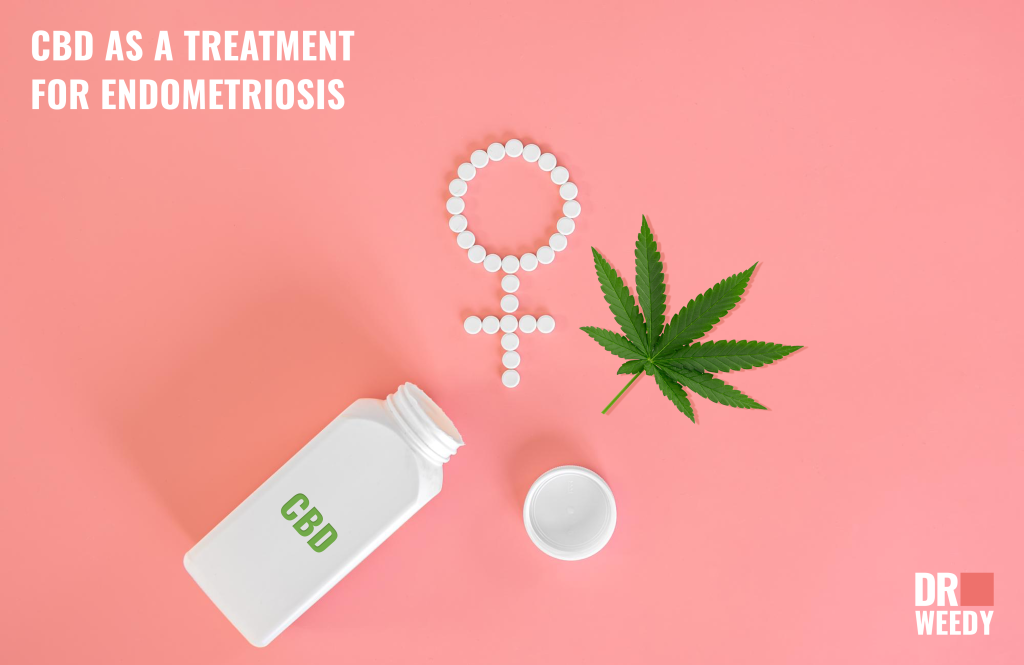
Endometriosis lesions develop only with intensive vascularization. At the moment, studies on the effect of cannabis on this pathological process are limited, but there is evidence supported by relevant studies that the CBD and THC contained in cannabis can inhibit the vascularization of cancer lesions. This means that medical cannabis can theoretically slow down the process of new blood vessels forming, thereby controlling the course of diseases such as endometriosis.
A separate aspect of the effect of cannabis on pathology is its ability to regulate nerve growth. In particular, patients with infiltrating endometriosis (a painful form with penetration into the intra-abdominal tissues) experience particularly unpleasant sensations due to the high density of nerves in the affected part. In this case, cannabis may prevent their activation by acting on CB-1 receptors. Patients with this form of pathology may have significant improvement in their condition when taking medical cannabis for endometriosis.
Another important property of medical cannabis is the calming of the overactive immune system, which can provoke inflammatory processes. A high concentration of CB-2 receptors is located on the killer cells of the immune system. When endocannabinoid receptors are activated, macrophages do not release inflammatory proteins, which allows them to take control of the pathological condition. Patients with endometriosis are particularly sensitive to inflammatory chemicals, so THC, activating CB-2 receptors, has a pronounced anti-inflammatory effect.
If we talk about the quality of life in general, then it is worth mentioning another aspect of cannabinoids. Today, when researchers are discovering new ways to influence the effects of cannabinoids on endometriosis, most patients use medical marijuana for endometriosis as a form of self-medication. Although Western medicine usually considers this drug as an adjunct in the complex therapy of endometriosis, there is still insufficient knowledge of the long-term side effects of such therapy. At the same time, in practice, the patient chooses the optimal combination of cannabinoids to improve their quality of life. What works for them may be a special variety of cannabis with their desired content of CBD and THC or an alternative form of marijuana. In any case, the fact that the use of cannabis improves the quality of life of such patients, improving both the physical and psychological state of the person, is supported by numerous surveys and studies.
Ways to use marijuana

Cannabis is very common as a part of preventive measures for endometriosis patients. It works especially well when combined with a special anti-inflammatory diet that includes a large amount of omega-3 fatty acids, antioxidants, and fiber. It also helps to combine the practice of meditation and acupuncture with CBD-containing drugs, which will give a synergistic effect and help alleviate the debilitating pain of endometriosis.
What form of medical cannabis should patients with endometriosis use? There is also no consensus here since each patient chooses the most convenient and effective form specifically for themselves. Doctors recommend focusing not on the form of taking CBD and THC, but on the effectiveness of a particular therapy. If smoking a certain type of weed helps a woman cope with cyclical pain in endometriosis, then she should focus on this form. If the oral form and extract for vaping are more suitable for the patient, they should utilize those modalities.
Dr. Weedy
If you have one or more symptoms of endometriosis, contact Dr. Weedy for professional advice. A qualified medical professional will give you the correct diagnosis and prescribe medical cannabis in the right form and dosage. You can overcome the pain and psychological discomfort right now by seeking help from Dr. Weedy specialists.
























